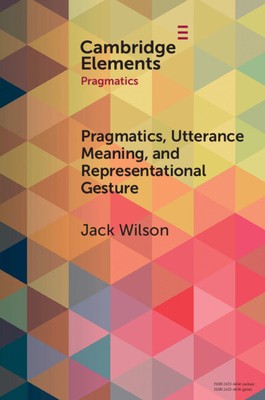
- We will send in 10–14 business days.
- Author: Jack Wilson
- Publisher: Cambridge University Press
- ISBN-10: 1009013793
- ISBN-13: 9781009013796
- Format: 15.2 x 22.9 x 0.5 cm, softcover
- Language: English
- SAVE -10% with code: EXTRA
Pragmatics, Utterance Meaning, and Representational Gesture (e-book) (used book) | bookbook.eu
Reviews
Description
Humans produce utterances intentionally. Visible bodily action, or gesture, has long been acknowledged as part of the broader activity of speaking, but it is only recently that the role of gesture during utterance production and comprehension has been the focus of investigation. If we are to understand the role of gesture in communication, we must answer the following questions: Do gestures communicate? Do people produce gestures with an intention to communicate? This Element argues that the answer to both these questions is yes. Gestures are (or can be) communicative in all the ways language is. This Element arrives at this conclusion on the basis that communication involves prediction. Communicators predict the behaviours of themselves and others, and such predictions guide the production and comprehension of utterance. This Element uses evidence from experimental and neuroscientific studies to argue that people produce gestures because doing so improves such predictions.
EXTRA 10 % discount with code: EXTRA
The promotion ends in 20d.21:46:59
The discount code is valid when purchasing from 10 €. Discounts do not stack.
- Author: Jack Wilson
- Publisher: Cambridge University Press
- ISBN-10: 1009013793
- ISBN-13: 9781009013796
- Format: 15.2 x 22.9 x 0.5 cm, softcover
- Language: English English
Humans produce utterances intentionally. Visible bodily action, or gesture, has long been acknowledged as part of the broader activity of speaking, but it is only recently that the role of gesture during utterance production and comprehension has been the focus of investigation. If we are to understand the role of gesture in communication, we must answer the following questions: Do gestures communicate? Do people produce gestures with an intention to communicate? This Element argues that the answer to both these questions is yes. Gestures are (or can be) communicative in all the ways language is. This Element arrives at this conclusion on the basis that communication involves prediction. Communicators predict the behaviours of themselves and others, and such predictions guide the production and comprehension of utterance. This Element uses evidence from experimental and neuroscientific studies to argue that people produce gestures because doing so improves such predictions.


Reviews